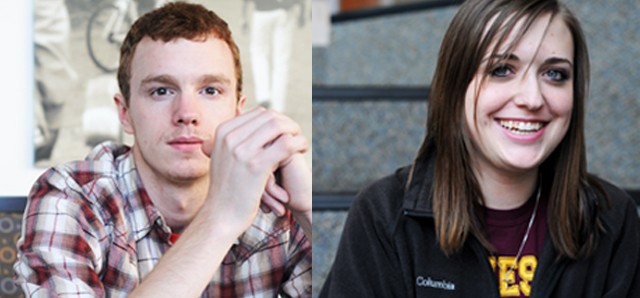Both Juliana Feldhacker and Andrew Pederson hoped to get involved at the University of Minnesota when they arrived as transfer students. They now head the two most organized politically based student groups on campus. Feldhacker is president of College Republicans and Pederson is president of DFL at the U of M. Both groups are struggling to promote enthusiasm for their respective parties at the University. They have opposing political views, but both presidents are working to reach out to a politically indifferent student body. Membership for each group noticeably expands during presidential elections, but the next presidential election is more than two years away. The 2008 election resulted in one of the most active memberships in the history of the DFL club at the University. Many students rallied around Barack ObamaâÄôs campaign, Pederson said. âÄúWe call it the Obama effect.âÄù Since the election, membership and interest in DFL at the U of M has been down; each meeting, Pederson expects about 15 students to attend. College Republicans average a weekly attendance of about 25 students. âÄúWhen I became chair, there was a lapse in leadership,âÄù Feldhacker said. âÄúThe group had started to fade. Membership was slipping. Frequent meeting attendance was down.âÄù Since becoming presidents for their respective groups, Feldhacker and Pederson have used the upcoming governorâÄôs race to channel growing political fervor into political participation. The Wellstone philosophy Pederson said he models his political involvement on campus after former U.S. Sen. Paul Wellstone. Pederson is a junior political science major at the University. He hopes to graduate this spring and use his experience to work with the statewide DFL organization. âÄúFor me, itâÄôs about the Wellstone philosophy,âÄù Pederson said. âÄúItâÄôs about politics being vehicles to improve peopleâÄôs lives.âÄù Pederson first came to DFL at the U of M as a member. He worked as the DFL outreach chairman for about a year before becoming president. âÄúI have to set up most of the events and coordinate amongst members and campaigns,âÄù Pederson said. âÄúAt the end of the day, we are a student group, and our meetings turn into social functions,âÄù Matthew Hayward, secretary of DFL at the U of M, said. âÄú[Pederson] has been a really great person at leading that.âÄù Pederson described the University as having a very liberal atmosphere. âÄúWe have a pretty warm reception at the University.âÄù The challenge for his group comes from attempting to organize students from around the large campus. Space, with a side of politics Feldhacker became president of College Republicans after the previous president struggled to organize the group. âÄúMembership was sliding toward the end of last year. With the previous chair, there were a lot of issues, things werenâÄôt quite clicking,âÄù Allison Blonski, College Republicans executive chair, said. âÄúShe worked really hard to line up speakers so people would be interested and want to come to meetings.âÄù On campus, Feldhacker faces an uphill battle. âÄúWe work on getting the word out that there are conservatives on campus,âÄù said Feldhacker. âÄúIf you are conservative, you donâÄôt have to hide that.âÄù Feldhacker is a political science and aerospace engineering major. She is graduating next spring and will pursue a career in aerospace engineering. âÄúI have always been fascinated with the idea of space exploration,âÄù Feldhacker said. âÄúI want to work for NASA or a private group that works with NASA.âÄù However, Feldhacker sees a role for politics in her future. âÄúI would like to run for local office, city council. Most of them have another job besides being a politician,âÄù said Feldhacker. âÄúOr I would like to work for a science and tech policy agency within the government.âÄù The race for governor Feldhacker and Pederson have worked to channel growing fervor surrounding the upcoming governorâÄôs race into political participation on campus, even though student turnout at on-campus caucuses was low. There were only 32 votes cast in the Democratic caucus, while only 12 votes were cast in the Republican caucuses on campus. In attempts to re-spark the political flame lost after the 2008 presidential elections, Feldhacker and Pederson have brought in previous gubernatorial candidates. âÄúWe want to make [students] aware of who is out there so they can make an important decision for themselves,âÄù said Feldhacker. College Republicans hosted a forum with candidates such as state reps. Marty Seifert and Tom Emmer, former state Rep. Bill Haas and state sens. David Hann and Phil Herwig. On the other side, the DFL brought in Minneapolis Mayor R.T. Rybak, former state Sen. Steve Kelley, former state House Minority Leader Matt Entenza and state Rep. Paul Thissen, all individually. In addition, the group is working on bringing in state House Speaker Margaret Anderson Kelliher, Pederson said. These efforts increased meeting attendance. Both the College RepublicansâÄô forum and the R.T. Rybak appearance brought in more than 50 students each. However, the presidents have failed to maintain high turnouts following the high-profile appearances. After caucuses, meeting attendance returned to levels at or below typical student turnout. Many students may be choosing either not to participate or are joining groups on the far left or right, such as Students for a Democratic Society or Students for a Conservative Voice.

Left: Andrew Pederson is president of DFL at the U of M. Right: Juliana Feldhacker is president of College Republicans.
Partisan groups aim to reignite political fervor
College Republicans and DFL at the U of M have seen fewer members since the 2008 elections.
Published February 14, 2010
0

